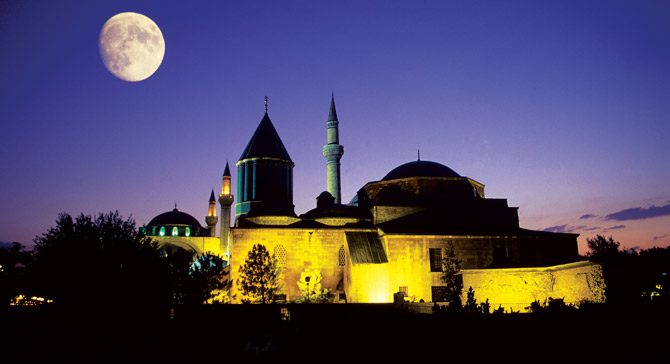
(Wikimedia Commons public domain photo)
The poetry of Jalal al-Din Muhammad Rumi (1207-1273) has been widely translated, and he has been called the most popular poet or the bestselling poet in the United States — which may well be true.
He’s certainly popular in large parts, though not all parts, of the Middle East, and especially among Iranians (he wrote almost entirely in Persian), Turks, and South Asians. He died in Konya (the ancient Iconium), where his tomb — the Yesil Türbe or “Green Tomb” — is a shrine and a place of pilgrimage. (It was turned into a museum under the rule of Mustafa Kemal Atatürk in the early twentieth century.) His epitaph reads: “When we are dead, seek not our tomb in the earth, but find it in the hearts of men.”
He can be, and often is, referred to as Rumi, which means “Roman” — from Rum (“Rome,” pronounced like English room, meaning “Byzantine,” since Byzantium was the late-surviving eastern Roman empire). He lived under the Seljuq Sultanate of Rum, in Anatolia or modern Turkey. But he is also commonly known by such titles as Mawlana or (in Turkish pronunciation rather than Arabic) as Mevlana (“our master”) or Mevlevi (“my master”).
The Mevlevi Order of Sufi mystics — aka the “Whirling Dervishes” — was founded after his death, but based on his teachings. Their service of music and whirling dance, the sama’, reflects his doctrine. He saw music, poetry, and dance as ways of approaching God, and he especially like the ney, or reed flute.
His teaching is popular and accessible in the West because of its emphasis on love, peace and tolerance, a positive outlook, goodness or beneficence, and charity. In a sense, he taught, all religions are pretty much true, including Islam, Judaism, and Christianity:
The religion of Love is different from all religions.
For lovers, religion and denomination are God alone.
(Book 2, Section 36, “Moses and the Shepherd”)
On the seeker’s path, wise men and fools are one.
In His love, brothers and strangers are one.
Go on! Drink the wine of the Beloved!
In that faith, Muslims and pagans are one.
(Quatrain 305)
But this shouldn’t be pushed too far. (The “New Age” abuses him somewhat.) He really was a Muslim.
In fact, he was a serious jurist (a specialist in shari‘a), as well as an Islamic scholar generally and a theologian.
Plainly, though, he’s most famous as a poet and a Sufi mystic
One of his principal themes is attaining union with God. He seems, however, to be talking about re-union. Thus, it’s very easy, from a Latter-day Saint point of view, to think (in this context) of the notion of a pre-mortal life.
Rumi begins his great Persian poem the Masnavi (or “Couplets”) with an extended reference to the plaintive sound of a reed flute, which reminds him of the yearning of the human soul for returning to its divine home:
Listen to this reed as it is grieving;
It tells the story of our separations.
“Since I was severed from the bed of reeds,
in my cry men and women have lamented.” (1-2)
This is the familiar ache of homesickness.
Whoever finds himself left far from home
looks forward to the day of his reunion. (4)
Far from ordinary, though, it’s cosmic homesickness.
Reflect upon this story, my dear friends;
its meaning is the essence of our state. (35)











